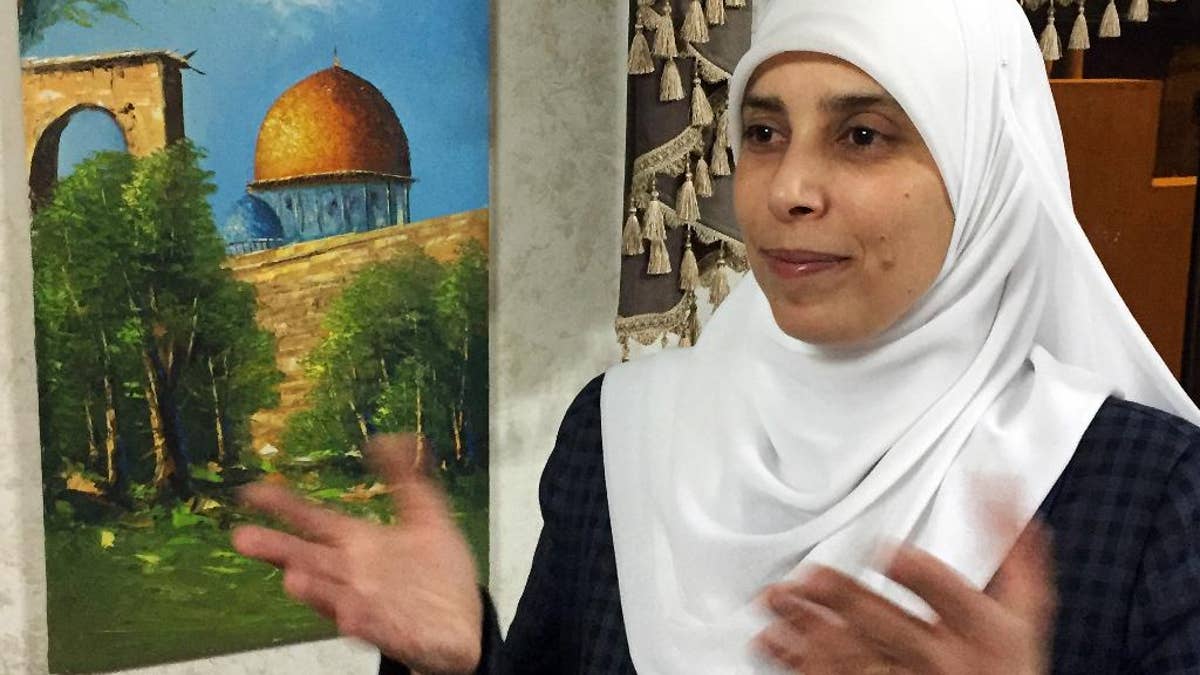
In this photo taken Tuesday, March 21, 2017, Ahlam al-Tamimi is photographed during an interview in her home in the Jordanian capital of Amman. Al-Tamimi, a Hamas activist on the FBI's list of Most Wanted Terrorists, said she is relieved Jordan's highest court has blocked her extradition to the U.S. where she faces charges in a 2001 suicide bombing in a crowded Jerusalem pizzeria that killed 15, including two Americans. The 37-year-old who guided the bomber to his target said she fears for her life after getting death threats and defends her role in killing civilians as legitimate resistance to Israeli occupation. (AP Photo/Omar Akour) (The Associated Press)
AMMAN, Jordan – A Hamas activist on the FBI's list of "most wanted terrorists" said she is relieved Jordan's highest court has blocked her extradition to the U.S., where she faces charges in a suicide bombing that killed 15 people, including two Americans, at a crowded Jerusalem pizzeria.
Ahlam al-Tamimi, 37, who chose the target of the 2001 attack and guided the bomber there, told The Associated Press that she "lived in fear" for her life until this week's high court ruling, in part because she had received threats, including from U.S. citizens, on social media.
She said she can't leave her native Jordan for fear of arrest if she travels abroad.
Al-Tamimi has been unapologetic about her role in one of the deadliest of scores of Hamas suicide bombings during the second Palestinian uprising against Israeli rule. She said Palestinians have a right to resist by any means, including with such attacks, against what she portrayed as a brutal military occupation.
"We are an oppressed people defending ourselves," al-Tamimi said in an interview this week in her home in the Jordanian capital, Amman. "We want Israel to leave our land so we can live in quiet."
Asked about her role in the killing of civilians, including children, she said: "I don't target children, but when the bomb goes off, it goes everywhere."
The blast at the Sbarro restaurant in downtown Jerusalem went off on the afternoon of Aug. 9, 2001. The assailant detonated explosives hidden in a guitar case packed with nails. Fifteen people were killed, including seven between the ages of two and 16, and scores of people were wounded.
Al-Tamimi was arrested by Israel several weeks after the bombing and sentenced to 16 life terms. She was released in a 2011 Israel-Hamas prisoner swap.
Since then, she has been a familiar media presence, including at one point hosting a talk show on a Beirut-based Hamas-run TV station about Palestinians imprisoned by Israel.
She has also spoken repeatedly about the attack, saying she was pleased with the high death toll.
On Monday, Jordan's high court ruled that al-Tamimi cannot be extradited from Jordan to the United States because the two countries don't have an extradition treaty.
In the U.S., she faces a charge of conspiring to use a weapon of mass destruction outside the U.S. against U.S. nationals. The charge was filed under seal in 2013 and announced by the Justice Department last week.
Al-Tamimi also became the newest and 29th entry on the FBI's list of Most Wanted Terrorists.
She said the U.S. has no right to charge her, arguing that she was already tried and sentenced in Israel.
"How come I should be returned to jail again for the same charge," she said Tuesday.
She said the U.S. proceedings disrupted the life she built with her husband Nizar, 43, who was also released in the 2011 swap, after serving 19 years for killing an Israeli.
Arnold Roth, whose 15-year-old daughter Malka, a U.S. citizen, was killed in the Sbarro blast, said this week's Jordanian court ruling was "appalling."
He said the aftermath of al-Tamimi's release has been difficult. "It's hard enough to lose a child," he said. "I can tell you that it is worse" to see those involved in the blast being celebrated.
Al-Tamimi was active in the Islamic militant group Hamas while studying journalism at the West Bank's Bir Zeit University at the time of the second Palestinian uprising. On her Twitter account, she describes herself as the first woman in the Izzedine al-Qassam Brigades, the Hamas military wing.
The uprising marked an especially bloody period in the long-running Israeli-Palestinian conflict, with some 3,000 Palestinians and 1,000 Israelis killed by early 2005.
Palestinians carried out shooting and bombing attacks, while Israeli forces reoccupied the West Bank in a harsh crackdown. Israel captured the West Bank, Gaza Strip and east Jerusalem in the 1967 Mideast war.
The leading Palestinian political factions, Hamas and Fatah, are at odds over a solution to the conflict with Israel.
Fatah, under Palestinian President Mahmoud Abbas, who oversees a West Bank-based autonomy government, hopes to set up a Palestinian state alongside Israel, roughly along the pre-1967 lines.
Hamas has called for Israel's destruction, but is formulating a new political program that refers to statehood in pre-1967 lines, without saying if it would consider this an end to the conflict with Israel or a stepping stone to an Islamic state in all of historic Palestine.
__
Daraghmeh reported from Ramallah, West Bank.
